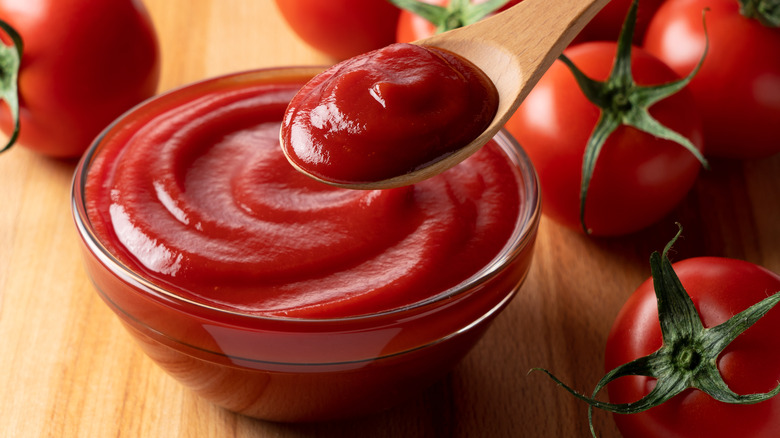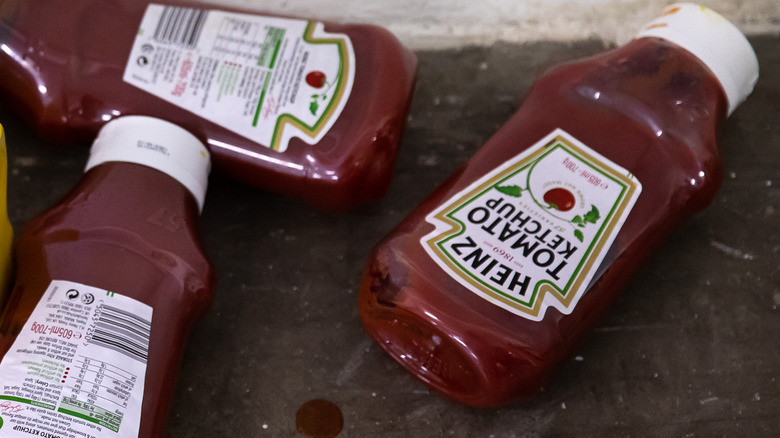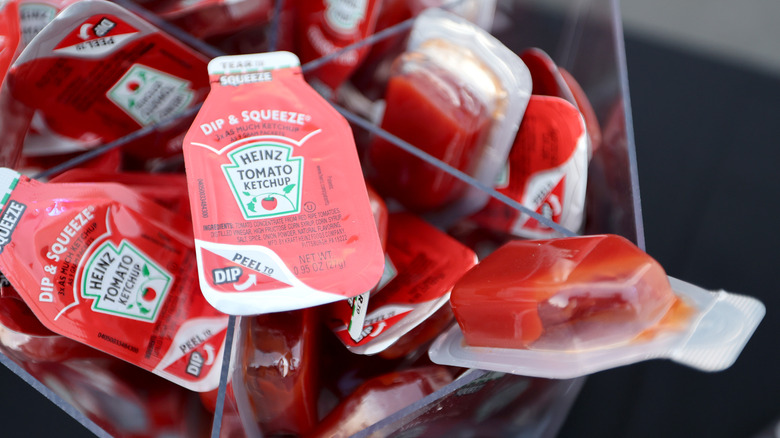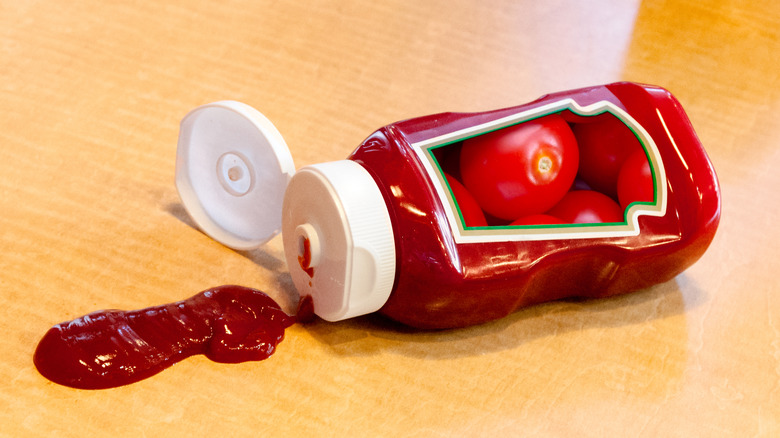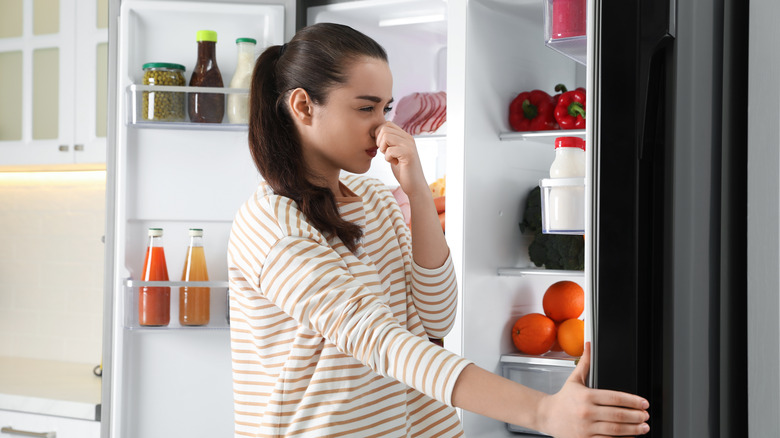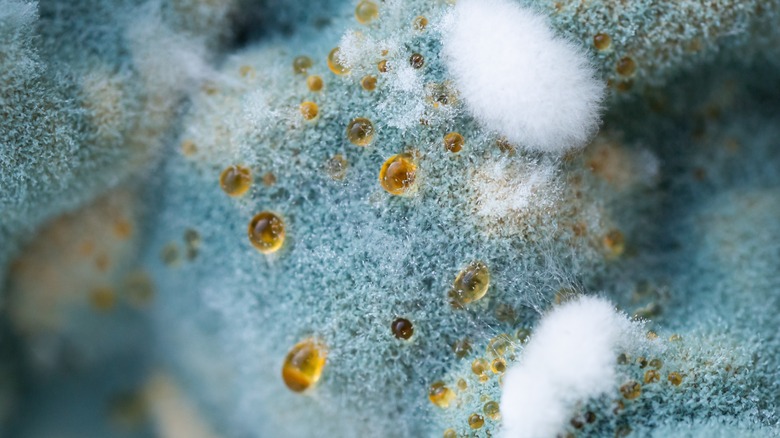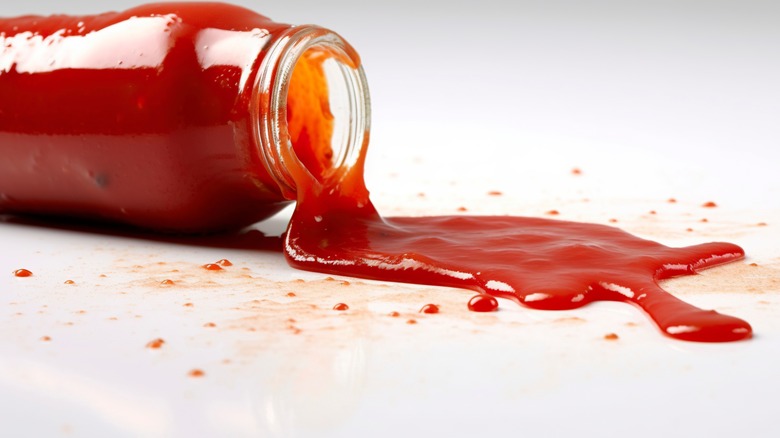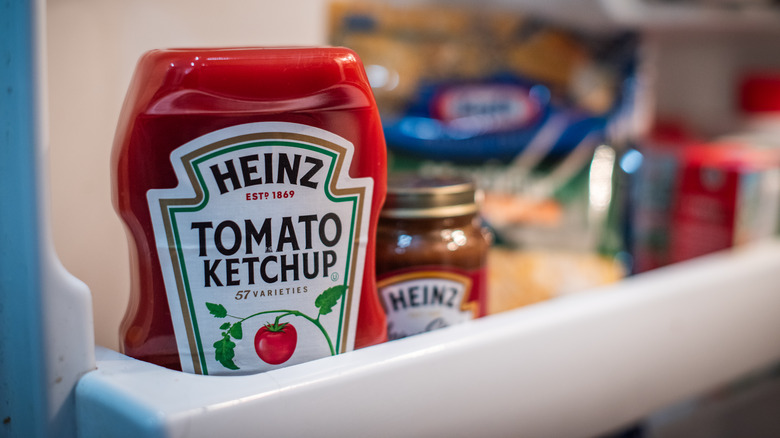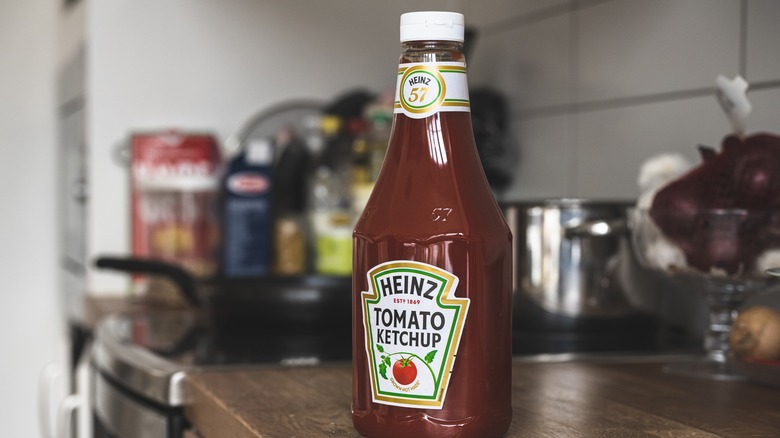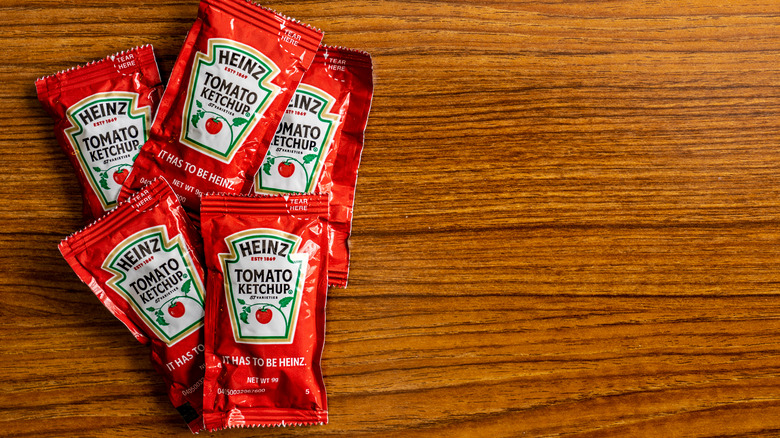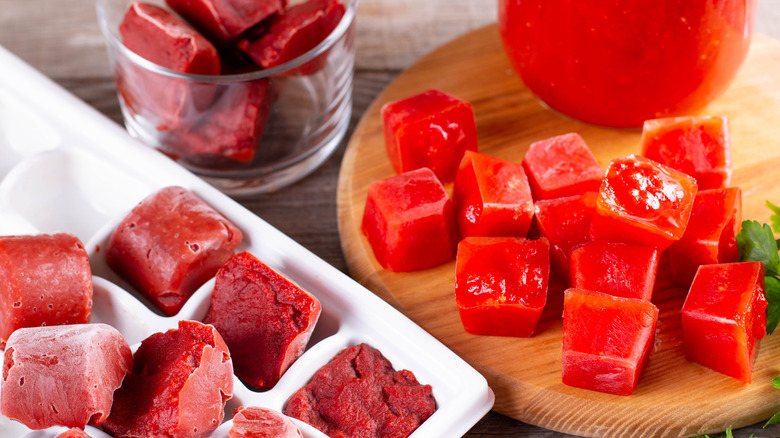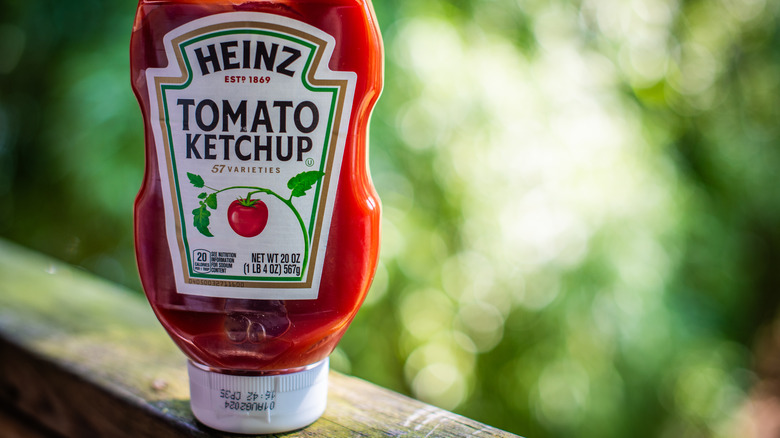Here's How To Know If Your Ketchup Has Gone Bad
If you're among 97% of Americans who keep a bottle of ketchup in the fridge or cupboard, you still may not have a good idea about how to tell if it's gone bad. Any differences from the norm can be a clue. However, we wanted to give some firmer guidelines regarding what changes in your ketchup should make you pause and take notice.
Does ketchup go bad? Even though it has plenty of vinegar and other preservatives to keep it good for a long time, it doesn't last on the shelf or in the fridge indefinitely. So, you should pay attention to the expiration date as well as other signs that it has gone bad. The ways to tell if your ketchup has spoiled range from visual and textural clues to the way it smells and tastes, as well as some clues related to its container. While some are about quality, others relate to safety. So, it's essential to be able to recognize the clues that can help you determine when it's time to give up on the bottle you have and buy another.
Examine it more closely if it has darkened
We all have a pretty good idea of what color ketchup should be. After all, we've seen fire-engine red ketchup everywhere from television and restaurant tables to our fridge and on our french fries all of our lives. So, if the color is different than usual, you will notice. Darkening isn't necessarily a sign that something has gone wrong with your ketchup, but it could be a red flag, so don't ignore it. The truth is that a lot of red sauces like ketchup, hot sauce, and barbecue sauce sometimes become a deeper, darker red the longer they sit on the shelf because of their exposure to oxygen. If you store your ketchup at a lower temperature and in the dark (like in your refrigerator), it's less likely to change colors and make you concerned.
Ketchup changing colors is a natural process, and it's usually safe to eat but not always. Darkened ketchup alone isn't a cause for concern, but it could also be an indication that the ketchup is older or has spoiled. So, you will want to check for some of the other signs that we mention throughout this article. If you have any doubts whatsoever, toss it. It's always better to be safe than sorry when it comes to possible food poisoning.
Notice if it has started to separate
Separating is another normal change you might see in ketchup that is harmless. A little separation is normal, but there is a point where you will want to throw it out. We've all experienced more liquid than ketchup coming out during that first squeeze of the ketchup bottle because the ingredients have separated. Separation should be expected, especially in unrefrigerated ketchup. During the process of making ketchup, the tomatoes naturally release pectin, which joins together with fiber to make a mixture that doesn't allow water to easily flow through it. However, the extra water eventually leeches out of the mixture when it sits for a while.
Usually, you can just shake the ketchup bottle to get everything homogenized again. If you shake the bottle and the liquids and solids stay separate, it's time to throw it out and buy some new ketchup. Extreme separation is more of a quality than a safety issue. If it's been sitting around long enough to separate so much that you can't get it back into solution, it's not going to be the best ketchup you've ever had anyway.
Toss it immediately if the bottle is bloated or spurts
According to the USDA, hissing, spurting, or bulging containers or lids can all be signs of a microbial problem like botulism. While it's not unusual for a vacuum-sealed package to make a small air-release sound while opening, a loud hiss is bad news. If the bottle or packet has blown itself up with air, hisses loudly, or spurts out under its own force the moment you open it, there should be no question in your mind that it's gone horribly bad. Don't even consider tasting it as a second test.
Since botulism doesn't grow in acids that have a pH below 4.6, you're more likely to find it in poorly-made homemade ketchup than commercially-made options since the latter ketchup has a pH of around 3.9. Luckily, botulism is extremely rare, but it can also be deadly, so you don't want to take any chances with it. Within 12 to 48 hours, it causes nerve-related eye problems and life-threatening breathing problems. Even if you get the antitoxin for it and don't die, there's still a chance for long-lasting nerve damage (via the World Health Organization).
If your ketchup bottle makes such a sound, is bloated, or spurts ketchup after opening, dispose of it in a heavy bag inside your trash and try not to touch the ketchup. If it's already spurted out, be sure to clean up the mess with heavy-duty cleaning supplies that can kill the microbes, like bleach.
Stop in your tracks if it smells odd
It's a good idea to pay attention to the way your ketchup smells before you consume it. Our sense of smell tends to be a good indicator of whether or not something has gone wrong with our food. Since ketchup has a familiar smell, you'll know when it smells off.
Every time you open up your bottle of ketchup and pour some out, you're also letting in a variety of bacteria and mold spores floating around in the air. Food safety consultant Jeff Nelkin told Vice that smells don't always indicate that it's spoiled. All the mold getting in through the air "stimulates some chemical reactions. ... If you leave it at room temp when it hits 30 days, you'll smell and see a difference in the quality of the ketchup, [and] it will have a funky taste or funky smell." With an unrefrigerated shelf life of around 30 days, once it's open, that funky smell is an indication that it's on its way out.
Foods give off a wide variety of smells when they spoil depending on the microbes that infect them. A smell test should never be the only way you determine if your ketchup is spoiled. However, if it smells funky, sour, yeasty, or has any other smell that's different than usual, it's a good indication that it has spoiled. So, it needs to head straight to the trash.
Don't continue eating it if it tastes wrong
As ketchup ages, it doesn't taste as good as when it's fresh. So, taste can be a good indicator of how soon you need to replace it. At its freshest, ketchup has a sweet flavor. However, the older it is, the less sweet and pleasing it will taste. Even if it hasn't expired or doesn't show any other signs of being spoiled, you might decide it's time to open up a fresh bottle for the sake of using a condiment with a higher-quality flavor.
You should also ditch the bottle if the taste seems off because it could be an indication that it's gone bad. Once ketchup starts to reach the end of its opened shelf life, it will start to have a more funky flavor. However, it's important to note that not all dangerous microbes produce an off-flavor as they infect your food and multiply, so you should never taste ketchup if you're suspicious that it might have gone bad. For example, the spore that causes botulism doesn't have a particular flavor, but one tiny lick of ketchup infected with it could be deadly.
Toss it if it has developed mold
The average room in a house or restaurant has 200 to 500 mold spores floating around it, with 1,500 mold spores still being in a normal range So, every time you open up a bottle of ketchup and expose it to the air, it has a chance of collecting some of those mold spores. If the ketchup bottle is outdoors, there are even more mold spores floating around. While the vinegar in ketchup kills some mold, it doesn't kill some more tenacious types.
Never chance it if you find mold in your ketchup. Throw the whole bottle out whether you find it on the surface of the ketchup or growing on the cap. Don't think you can just remove the visible mold and keep using it like with cheese. Just because one spot hasn't developed a visible colony yet doesn't mean that it hasn't infected the condiment and penetrated beneath the surface. Homemade ketchup is especially susceptible to growing mold quickly if you leave it out, so always refrigerate it. Moldy ketchup contains mycotoxins, which have the potential to produce a wide range of negative systems from gastrointestinal problems, liver disease, cancer, or even death (per Healthline). So, eating moldy ketchup is a risk you don't want to take.
Don't chance it if the bottle is cracked
The CDC advocates for throwing out any food container that is cracked, and this includes ketchup. If your ketchup container is cracked, any bacteria or mold spores floating around in the air can land inside. Thus, the longer it's exposed to the air, the more microbes it can accumulate and grow inside. A cracked container could also indicate that the container became bloated and broke from the pressure, which could be an indicator that it was infected with a microbe of some sort.
If you find the container in the fridge or on the shelf and it's broken, toss the container and the ketchup. However, if you accidentally drop the container and crack it yourself, you'll want to remove the ketchup and put it in another sealable container to prevent excess microbes from building up inside, and potentially making it unsafe to consume with time. Something else to watch for is a loose lid. Even if the container was plastic and didn't crack from a build-up of pressure, it still might have loosened the lid. So, it may indicate the same thing as a cracked bottle does.
How should you store ketchup?
The war over whether you should store your open bottle of ketchup in the fridge or on the countertop will probably rage forever. Heinz UK once Tweeted a poll to find out where most people keep their ketchup. 63.2% said they kept theirs in the fridge, while 36.8% said they kept theirs in the cupboard.
Food scientist Dr. Donald W. Schaffner told The Guardian, "Condiments like ketchup are formulated with things like acid, salt, and added sugar, which all work as preservatives. The reason a lot of food safety experts say to refrigerate ketchup is because they're erring on the side of caution." Even if it stays safe, ketchup also tends to discolor, separate, and change in flavor when you keep it outside the fridge, so it's mainly a quality issue. Heinz's official stance is to store it in the refrigerator after opening because "Refrigeration will maintain the best product quality after opening" (via Vice).
Keeping ketchup outside of the fridge works just fine for restaurants or people who are putting ketchup on their food every day since they finish a bottle quickly. However, since it has a shorter shelf life outside the fridge, those of us who don't eat it as often should keep it in the fridge unless we just like to replace near-full bottles of ketchup on the regular. As long as you throw it out once it goes bad, you can store your ketchup any place you want.
How long does a bottle of ketchup last?
If you buy a bottle of ketchup and keep it unopened on the shelf, it will stay good for a year or two under ideal conditions, and top quality for a year. The ideal conditions are in an area that is both cool and dry. You'll also want to look at the expiration date as an indication of how long the manufacturer expects it to still be at top quality.
After you've opened a bottle of ketchup, how long it lasts depends on where you store it. If you store it at room temperature on the countertop, tabletop, or pantry, it will only last for a month. So, it's best to choose this option only if you intend to go through the entire bottle in a month or less. To keep it at its best quality for the longest, you'll want to refrigerate it after opening. In the fridge, it will keep its quality for nine to 12 months. After a month outside of the fridge or nine to 12 months inside the fridge, you'll want to keep a watch for any color, textural, smell, or flavor change.
If you make homemade ketchup, don't expect it to last as long as commercially-made ketchup. It will need refrigeration and is only good for about three weeks. If you find that you've made more than you can eat in three weeks, the excess will keep in the freezer for up to six months.
What's the shelf life of a ketchup packet?
While you don't have to refrigerate ketchup packets, they won't taste great indefinitely. Kraft Heinz spokesperson Lynne Galia told HowStuffWorks that, "They have a shelf life of about 9 months." That shelf life greatly reduces under non-ideal conditions, like in the glove compartment of your car. Unfortunately, individual packets don't always have expiration dates, so it can be difficult to know how old your ketchup packets are. Most companies just list the expiration date on the box that all the packets come in rather than stamping each packet individually. So, if you have a hoard of ketchup packets, it might be worthwhile to go through them and cull the oldest ones.
If you don't remember when you got them or know that they've been sitting in your stash for a few years, they're not going to taste the best when you go to dip your fries in them. With all the preservatives in ketchup, it's not likely to make you sick if it's older, but it's probably going to be separated and not taste the best. If it smells or tastes bad after you tear it open, just throw it in the trash. If you want to be more methodical about knowing how old your ketchup packets are, you can always date them with a Sharpie. Another option is to put them in dated plastic bags so you know just how old they are before ruining a hamburger.
Can you freeze ketchup to make it last longer?
While you can freeze ketchup, it doesn't yield the best results. It already lasts for a decent amount of time unopened on the shelf or opened in the fridge, so it's best just to refrigerate it if you plan to finish it off in a year. However, If you've opened up a container of ketchup that's too big for you to consume in a year, freezing might be a viable option to prevent wasting it. After all, it will last indefinitely frozen. While the flavor won't change, the main reason we discourage freezing ketchup is that the texture will change. Not only is defrosted ketchup thinner, but all the ingredients separate when they thaw. But you can stir it to help turn it into a homogenous product again.
If your ketchup is in a glass bottle, you'll want to put it in another container before freezing. Plastic is fine as long as the bottle isn't full. It will need room to expand during the freezing process. If you don't plan to thaw it all out at once to use it at the same time, it might be best to freeze it into ice cubes so that you have individual servings that you can thaw one or two at a time as the need arises.
What happens if you eat expired ketchup?
An unopened bottle of expired ketchup is still good to eat for a while. The expiration or best-by date for ketchup doesn't tell you when it will spoil. Instead, it tells you how long it will be at its best quality. All the salt, sugar, and acid in ketchup helps to keep it safe to consume past the expiration date. However, if you have an opened bottle of ketchup past its expiration date, you should definitely check for signs that it has spoiled, starting with visual cues like mold and bottle damage, as well as smell and taste.
Still, it's best to err on the side of caution and not push your luck with expired ketchup. Bad things can happen when you eat expired ketchup. According to an employee at the FDA, they tend to deal with 50 to 100 severe cases of food poisoning each year related directly to ketchup. Luckily, the number of ketchup-related deaths tends to be much lower. In the 2010s, there were a couple of deaths connected to Heinz ketchup made from tomatoes grown in California. The FDA representative said, "The best way to prevent this is to throw away any food that expires within the same month being used." (via Answers).
